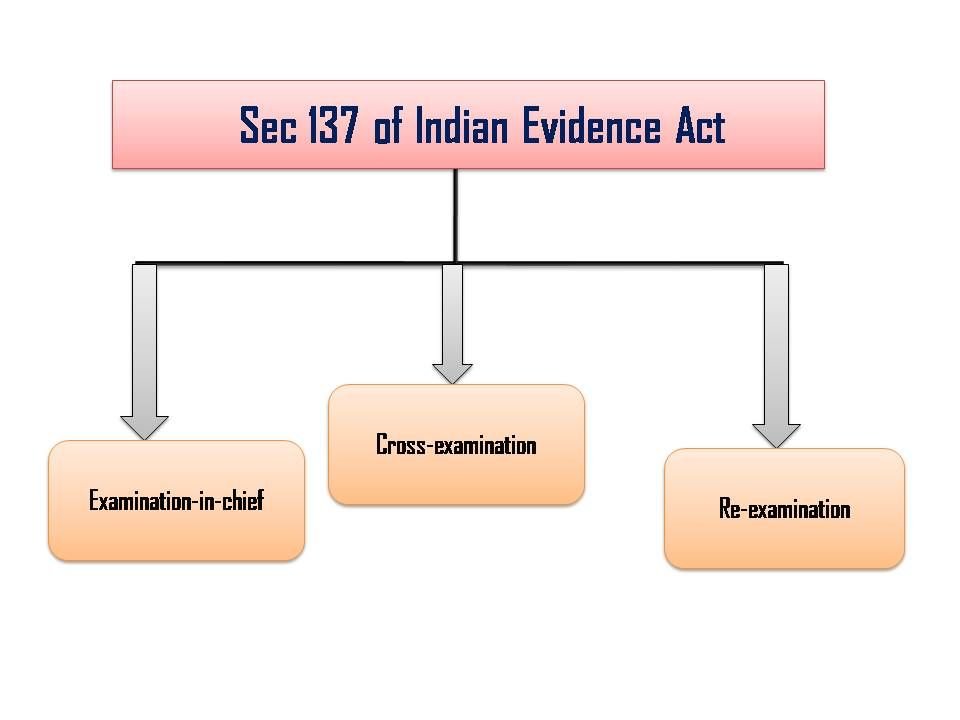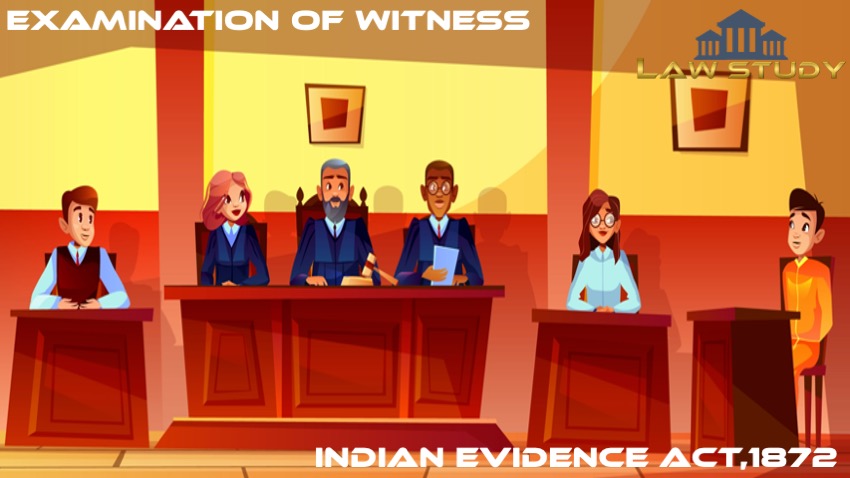Introduction to the Witness Examination under the Indian Evidence Act of 1872: – The witness’s testimony is preserved in the form of responses to questions put to him. Witnesses are not allowed to give a speech in front of the court and are only expected to answer questions.
In this way, the witness’s testimony can be limited to the facts relevant to the case. The process of questioning witnesses is referred to as his or her examination.
Examination of Witness
Following are the 3 stages of a witness’s examination
Examination-in-Chief
The examination by the party who calls a witness is referred to as a direct examination. The testimony is first examined in chief and then cross-examined if requested by the opponent.
When a witness appears in court, he is administered an oath or affirmation. His name and address are recorded. The party calling the witness then has the authority to question him in order to induce all material facts within his knowledge that tend to prove his (the party calling the witness) case. This is known as examination-in-chief.
Object of Examination-in-chief
The objective of cross-examination-in-chief is to elicit the facts and to prove pertinent facts in favor of the party who called the witnesses. The aim of his examination is, in other phrases, to obtain all facts from the witnesses regarding the cases of the parties he is aware of. It must be limited to the facts concerned, and without the permission of the court, leading questions cannot be asked.

Cross-examination
The adverse party’s cross-examination of a witness is known as cross-examination. A party’s opponent has the right to cross-examine his chief witness after he has been examined.
Importance of cross-examination is the questioning of witnesses summoned by one party’s attorney with the goal of either obtaining a favorable admission or discrediting the witness.
Object of the Cross-examination
The objective of cross-examination is to determine whether the witness’s statements are true. It’s an attempt to dissect a witness or show that his testimony can’t be trusted.
Cross-main examination’s purpose was to examine the accuracy, authenticity, and value of the evidence presented in chief, to shift the facts already stated by the witness, to identify and expose differences, and to produce suppressed evidence to substantiate the cross-examining party’s case.
Re-examination
Re-examination is the examination of a testimony when he has been cross-examined by the defendant who called him. If the party who called the witness wishes and if it is necessary, he may re-examine him. The re-examination must be restricted to the objections faced during cross-examination.
The Object of Re-examination
Re-examination’s purpose is to ask any questions that may be required if the opposing party has the right to cross-examine the testimony at that point so that the witness should provide a proper explanation or interpretation of expression during cross-examination.
Order of Examination
Sec. 138 of the (I.E.A) Indian Evidence Act governs the order of examination, wherein the witness is examined in chief, then cross-examined, and then re-examined (if the opposition party so desires).
The examination & cross-examination must be concentrated on pertinent facts, but the cross-examination should not be limited to the facts on which the witness testified during his chief examination.
Direction of Re-examination
The purpose of re-examination is to clarify matters raised in cross-examination and if a new issue is raised in re-examination with the court’s permission, the opposition party may cross-examine the matter further.
Section 141 leading question
The phrase “Leading Questions” literally means a question that suggests an answer. Any questions that ultimately led to an answer, as predicted by the person who asked the question.
“Whatever question trying to suggest the answer which the person who put it desires or receives,” according to “Leading Questions.”
Examples: –
- Is your name so and so?
- Have you not lived with him for so many people?
It is evident that using this form, any type of information can be expressed in the witness statements in disguise using this form.
It could be used to prepare him to obtain a required response to the questions that would be presented to him, the examiner while denying the truth and asking for information/details is actually providing rather than receiving it.
Section 142
When it’s not appropriate to ask leading questions (section142)
If the opposing party objects, leading questions will be asked only with the court’s permission during an examination-in-chief or re-examination. The court may ask leading questions about matters that are either introductory or undisputed or that have already been sufficiently proved in its opinion.
When are leading questions acceptable?
Leading questions may be asked during cross-examination, As per Sec.143 of I.E.A,1872.
Questions lawful in Cross-examination (section 146)
In addition to the questions listed above, testimony may be asked those questions that tend to test his veracity during cross-examination: –
- To discover more about him and what he does in his various roles in life, or
- To try to discredit his reputation by causing harm to his character, even if the answers to such questions may tend to criminate him or reveal him to a penalty or forfeiture, whether directly or indirectly.
In a prosecution for an offence under sections 376, 376A, 376B, 376C, 376D, AND 376E of I.P.C (45 of 1860), Where the issue of consent arises, it shall not be to such victim’s general immoral character, or past physical intimacy with any person, to prove such consent.
Court procedure where there is no reasonable ground for asking questions (section 150)
Whereas if the court determines that a question was asked without justification, it may refer the facts of the case to the high court or another authority to which the prosecutor, pleader, wakil or defense attorney is subject in the course of his practitioner.
Section 151
Questions that are both Indecent and scandalous (section 151)
The court may prohibit indecent or scandalous questions or inquiries, even if they have some direct effect on the questions before the court, although if they connect to the facts of this case or issues to establish whether or not the facts in the issue existed.
Section 152
Intimidating or annoyance-inducing question (section 152)
Any question that appears to the court to be intended to insult or offend, or that, whereas proper in its own right, appears to the court to be needlessly offensive in form, shall be prohibited.

























